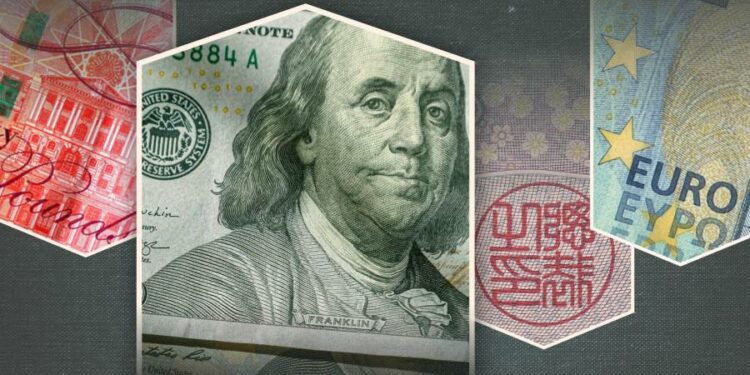The surging dollar has prompted some analysts and investors to forecast a new period of “reverse currency wars” as many central banks abandon a longstanding preference for weaker exchange rates.
The new dynamic marks a departure from the period of low inflation that followed the 2007-09 global financial crisis, when historically low interest rates and large-scale asset purchases — which were partly aimed at boosting growth through a weaker currency — sparked accusations that some economic policymakers were pursuing a currency war.
But in the global burst of price growth that has followed the coronavirus pandemic, stoked even further by Russia’s invasion of Ukraine, the focus for central banks has shifted from encouraging growth to bringing down inflation.
“We are now in a world where having a stronger currency and offsetting the forces driving inflation is something that policymakers actually welcome,” said Mark McCormick, head of foreign exchange strategy at TD Securities.
The dollar hit its highest level against a basket of rival currencies in 20 years this week as traders respond to the Federal Reserve’s attempt to cool inflation with sharp rate rises. But where once central bankers outside the US might have embraced the rampaging dollar, now they feel shifts in exchange rates have added extra pressure to keep pace with the Fed, McCormick argues.
A weaker currency pushes up inflation by increasing the price of imported goods and services. According to analysts at Goldman Sachs, who have identified a new era of “reverse currency wars”, central banks in big developed economies need to raise interest rates on average by an extra 0.1 percentage points to offset a 1 per cent decline in their currencies.
The euro touched a five-year low against the dollar of less than $1.05 last week, sparking renewed speculation that it could fall to parity with the US currency as the fallout from the Ukraine conflict holds back the eurozone’s economy. The 7 per cent decline so far this year has not gone unnoticed at the European Central Bank.
Isabel Schnabel, an influential member of the ECB’s governing council, said in an interview this week that the central bank was “closely monitoring” the inflationary effects of a weaker euro, although she reiterated the mantra that the central bank does not target the exchange rate.
Still, given their economies’ proximity to Ukraine and their greater reliance on energy imports, investors increasingly think central banks in Europe will struggle to keep up with the Fed. The pound slumped to a two-year low this week even after the Bank of England raised rates for its fourth meeting in a row, as it also warned that the UK is headed for a recession later in the year.
Sterling weakness could begin to worry BoE policymakers, Goldman Sachs strategists warned in the run-up to the meeting. “At some point, the ‘reverse currency wars’ mentality could become more prevalent in the BoE’s mind, with currency weakness exacerbating an already bleak inflation outlook,” Goldman wrote in a note to clients.
The Swiss National Bank, for so long one of the most active currency warriors, with its policy of not allowing the franc to appreciate too much, has also changed its tune. Andrea Maechler, a member of the SNB’s board, said this week that a strong franc has helped ward off inflation, which has risen in Switzerland this year but far less than in the neighbouring eurozone.
The Bank of Japan has largely stood apart from the newfound aversion to a weaker currency, sticking with its ultra-loose monetary policy even as the yen takes a historic tumble. Even so, the speed of the yen’s decline has stirred increasing speculation that Japan’s finance ministry might step into markets to prop up the currency for the first time since 1998.
The strong dollar has also been creating problems in emerging market countries, particularly those with a significant amount of debt denominated in dollars. Even before this year’s run-up in the dollar, roughly 60 per cent of low-income countries were at risk of debt distress, according to the IMF.
“The strong dollar is part of why you’re seeing very limited investment in emerging markets today. Because that is a big risk. The dollar liabilities in much of emerging markets today are sizeable, not just on the sovereign level, but also at the corporate level,” said Rick Rieder, chief investment officer for global fixed income, BlackRock.
According to Karl Schamotta, chief market strategist at Corpay, such strains are the latest reminder that the dollar is “our currency, but it’s your problem”, in the words of former US Treasury secretary John Connally in the early 1970s.
Given the dollar’s unique role at the heart of the global financial system, its strength makes it tougher for businesses and households to access finance in many economies outside the US.
“As the dollar rises, we are seeing a tightening of global financial conditions,” Schamotta said. “The US continues to make the world’s weather.”











